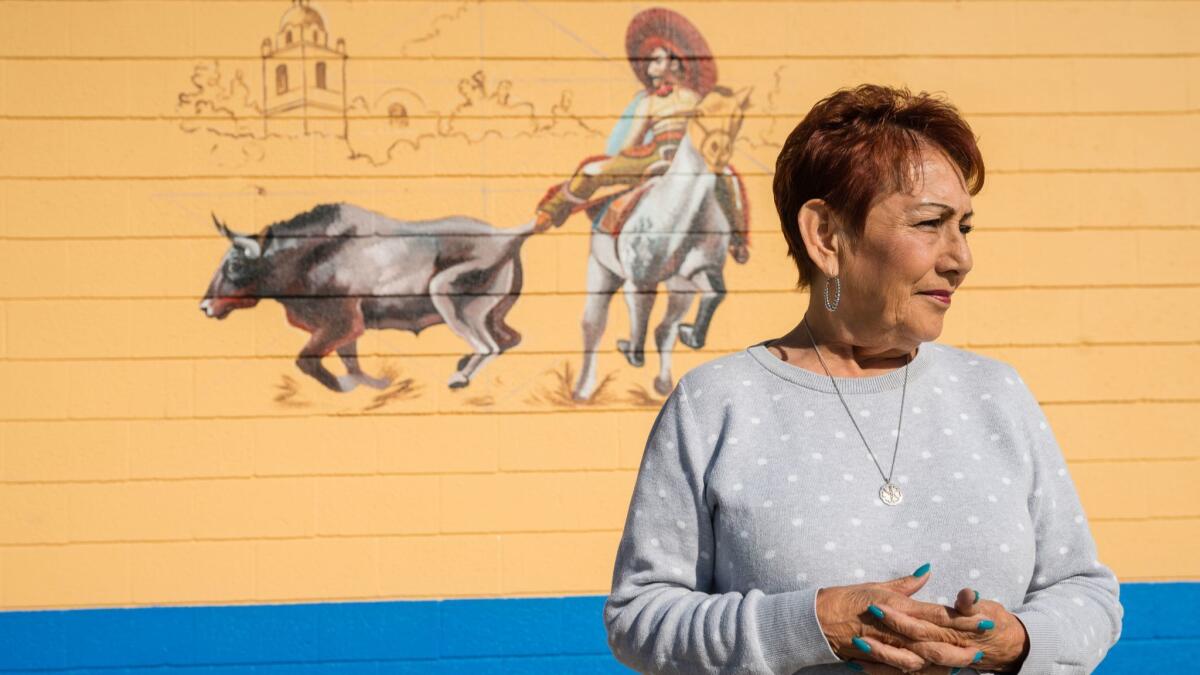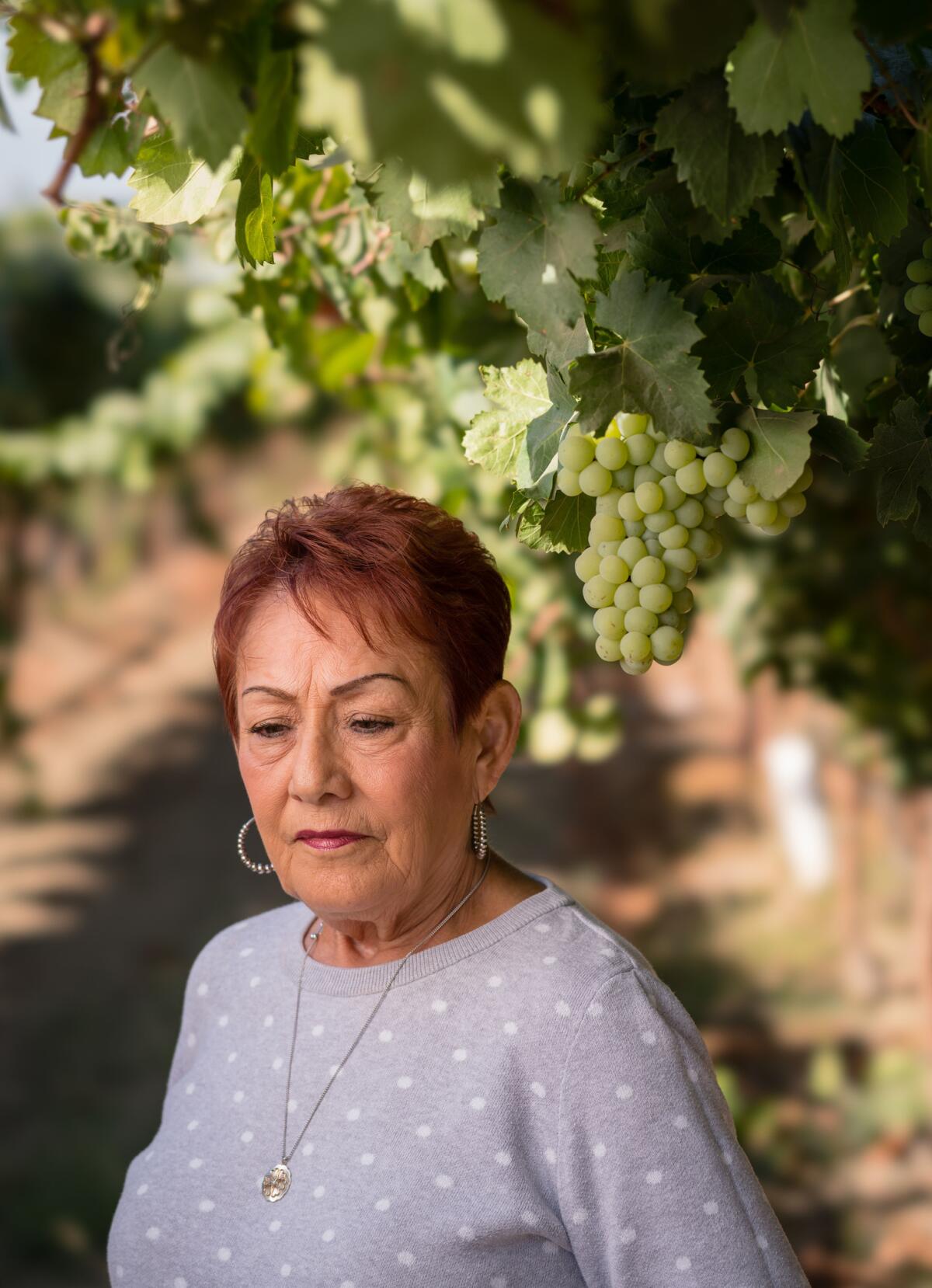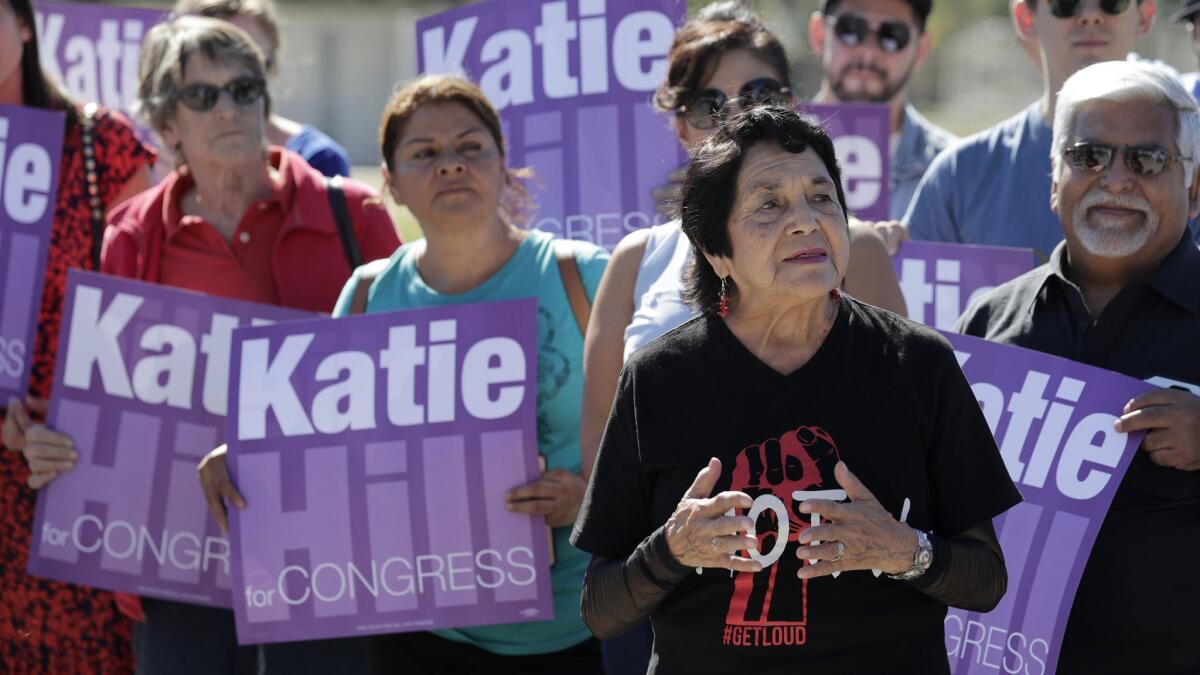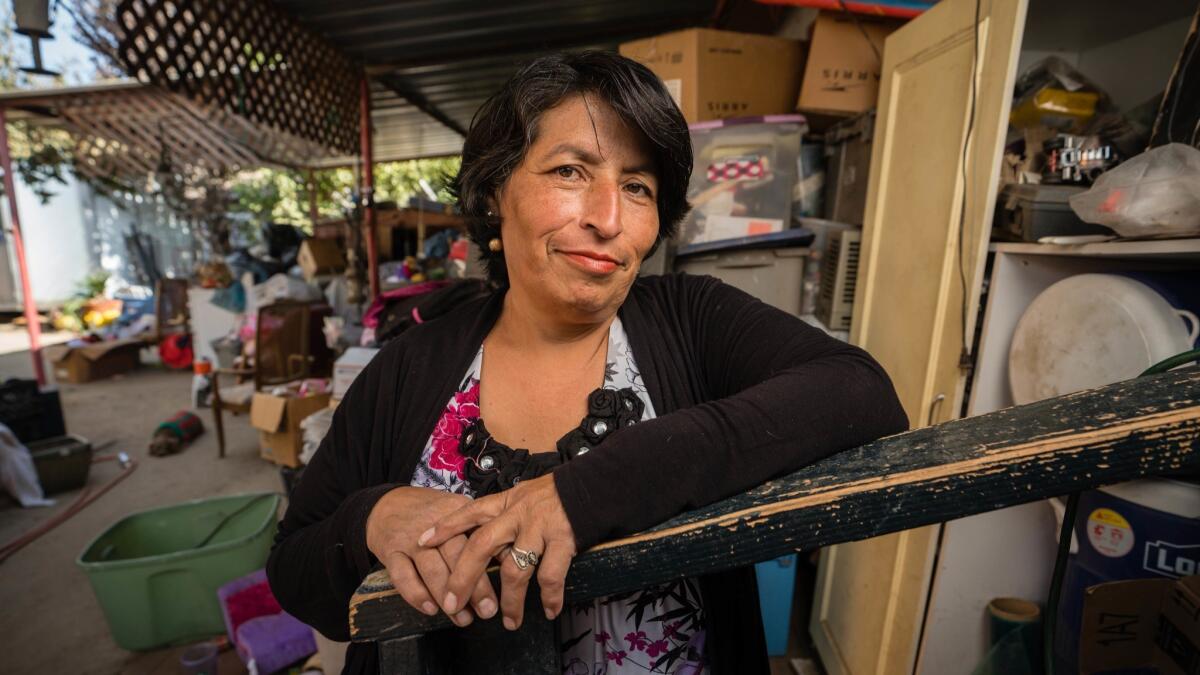Column: Will Latinos in racially polarized Kern County finally get the representation they deserve?

- Share via
Reporting from Delano, Calif. — Grace Vallejo is the mayor of Delano, the farming community along Highway 99 that is the birthplace of the United Farm Workers movement. Vallejo’s parents, first-generation Americans, were migrant farmworkers in the Central Valley who took their kids with them to pick grapes, potatoes and cotton around Delano and fruit crops such as peaches and plums in the north.
It was an era when there were no toilets in the fields, no breaks, and farmworkers had to pay a nickel for a cup of water. It was also a time when teachers felt free to rap children on the head for speaking Spanish on the playground.
“At the time it was the rule,” Vallejo said as we sat in the living room of her modest home. “You know, we followed the rules.”
On Wednesday, Vallejo, 72, was home, working on her latest campaign. She is running for supervisor in one of Kern County’s newly configured districts, drawn after a federal court decision meant to correct years of discrimination against Latino voters.
Instead of one majority-Latino supervisorial district, Kern County now has two.
Vallejo is running against incumbent Supervisor David Couch, a financial advisor, whose previous district would probably have led him to a comfortable reelection. Instead, because of the new map, 68% of the citizen-voting-age population of this new district, the 4th, has Latino surnames.
For years, the Kern board has consisted of four white Republican men and one Latino, or more recently, one Latina Democrat, Leticia Perez. Perez is regularly outvoted 4 to 1.
If Vallejo wins, there will be a record two Latina supervisors.
For the first time ever, the board might look a little more like its constituents.

There are many ways to deny voting rights in present-day America.
You can knock people off the voter rolls because the name on their legal ID is not an exact match with their voter registration. You can limit the number of polling places, forcing people to travel long distances or wait in long lines.
Or you can redraw the lines of their political districts in order to dilute, say, the Latino vote, and keep power in the hands of whites.
As the Latino population of Kern County has exploded, it just didn’t seem right that Latinos had only one representative on the five-member Board of Supervisors. Yet when the supervisors redrew their districts to accommodate demographic changes confirmed by the 2010 census, they managed to approve a map that would preserve, for lack of a better phrase, their white hegemony.
“It was about the power of the incumbents who wanted to keep their job,” said Thomas A. Saenz, president and general counsel of MALDEF, the country’s leading Latino legal and civil rights group, which sued Kern County for violating the federal Voting Rights Act. “But the consequence was to step on the rights of a minority group.”
It should not have taken a federal lawsuit to force Kern County to do the right thing, but like a lot of places, Kern has a pernicious history of racial discrimination.
Perhaps it should not have come as a surprise that the Board of Supervisors decided to fight the lawsuit, but the move turned out to be as foolish as it was costly. Because the county lost, it had to pay not just its own legal costs, but MALDEF’s, bringing the total bill to about $6 million.
What an indefensible waste of money at a moment when many county employees have not received a raise in a decade, streets in unincorporated areas are unpaved, roads are unlighted and stray dogs roam the streets.
Last March, the supervisors considered an appeal. They heard from numerous constituents, almost all of whom urged them to stop fighting.

Near the end of the meeting, Dolores Huerta, 89, cofounder of the United Farm Workers, rapped the board for lack of transparency when it created illegal boundaries in 2011.
“There has been racial bias on this board,” she said. “This is a chance to correct it.”
The supervisors gave up the fight.
A new map was drawn.
::
Huerta’s youngest daughter, Camila Chavez, 42, whose father was Richard Chavez, brother of Cesar, is executive director of the Dolores Huerta Foundation.
“The general feeling has been that we are not being represented,” Chavez told me at the foundation’s Bakersfield headquarters. “Over 50% of the county is Latino.”
On May Day last year, she said, there was a march for immigrants’ rights. Two days later, Kern County Sheriff Donny Youngblood introduced a resolution asking supervisors to name Kern an anti-sanctuary city. That was voted down. But a week later, he asked the board to go on record opposing the Sacramento bill to make California a sanctuary state, and the board approved it, 4 to 1.
Supervisor Couch voted yes on both anti-sanctuary measures.
“It feels awful,” Chavez said. “Like a slap in the face.”
Also, in 2007, when he was a Bakersfield city councilman, Couch proposed making English the official language of Bakersfield, that Bakersfield declare itself a non-sanctuary city and that city staff try to figure out a way to cut off undocumented immigrants from municipal services.
“David’s never walked any of that stuff back,” said Mark Martinez, chairman of the political science department at Cal State Bakersfield, who led a mostly successful effort to clear the field of other Latino contenders so that Vallejo would have a clear shot. “When I was taking to Grace, I said, you have to hit him over the head with that every single day, but that’s not who Grace is.”
Couch has been working hard to get to know the new areas of his district, said longtime Kern political observer Mark Salvaggio, and has the endorsement of many local Latino elected officials.
“There is no magic to it,” Couch told me. “You just show up. You extend your hand, meet people and work with them.”
And he may very well win. The winner of this seat will need only a plurality of the vote, and at the last minute, a third candidate decided to run. Jose Gonzalez of Bakersfield manages a credit union in Lamont, a run-down little town southeast of Bakersfield. He is a political neophyte, with hardly any money. But with a Latino surname, he may act as a spoiler, splitting the Latino vote.
“Obviously, we hope the candidate that is elected next week is the candidate favored by the Latino community,” Saenz said. “But ultimately, this is going to be an enduring Latino-majority seat.”

I wanted to see some of the more challenged parts of Kern County, which happen to be part of the newly created 4th District.
So just before children started trick-or-treating on Wednesday, I drove to Weedpatch, an impoverished neighborhood next door to Lamont with a rich claim on the state’s agricultural history. In a dusty frontyard on Harold Street, I chatted with Leticia Prado.
She and her husband, Timoteo, are Mexican immigrants, American citizens and community activists. Leticia is a member of the public utility district and school board.
Her street is only half paved — blacktop on one side, plain dirt on the other. The dirt side gets muddy when it rains and is pocked with holes. “I sweep the street,” she said, “and put dirt in the holes.”

She wishes she could get more help from the county. “Nobody cares,” she said. “They just don’t care about this area.”
This is not strictly true; until redistricting, the area was represented by successive Latino supervisors who have overseen many improvements over the last few years. There are blocks in Weedpatch and Lamont that have only recently gotten paved sidewalks and curbs. But so much work remains.
“It doesn’t matter who lives there or what language they speak,” said Couch, who inherited this part of the 4th District a little over three months ago when the new map went into effect. “The conditions are abysmal. I don’t know why this area has been so neglected.”
A block and a half away, on a busy corner, an empty dumpster perched on the curb, flies swarming in the warm evening light. A few stray dogs trotted along sidewalks, looking as if they knew exactly where they were headed.
The next supervisor, regardless of ethnicity or last name, has got to do better by outposts like Weedpatch.
“I’d be happy to have you hold our feet to the fire,” Couch said. “I view that area as a huge opportunity. I can’t screw it up.”
Twitter: @AbcarianLAT
More to Read
Get the L.A. Times Politics newsletter
Deeply reported insights into legislation, politics and policy from Sacramento, Washington and beyond. In your inbox twice per week.
You may occasionally receive promotional content from the Los Angeles Times.











